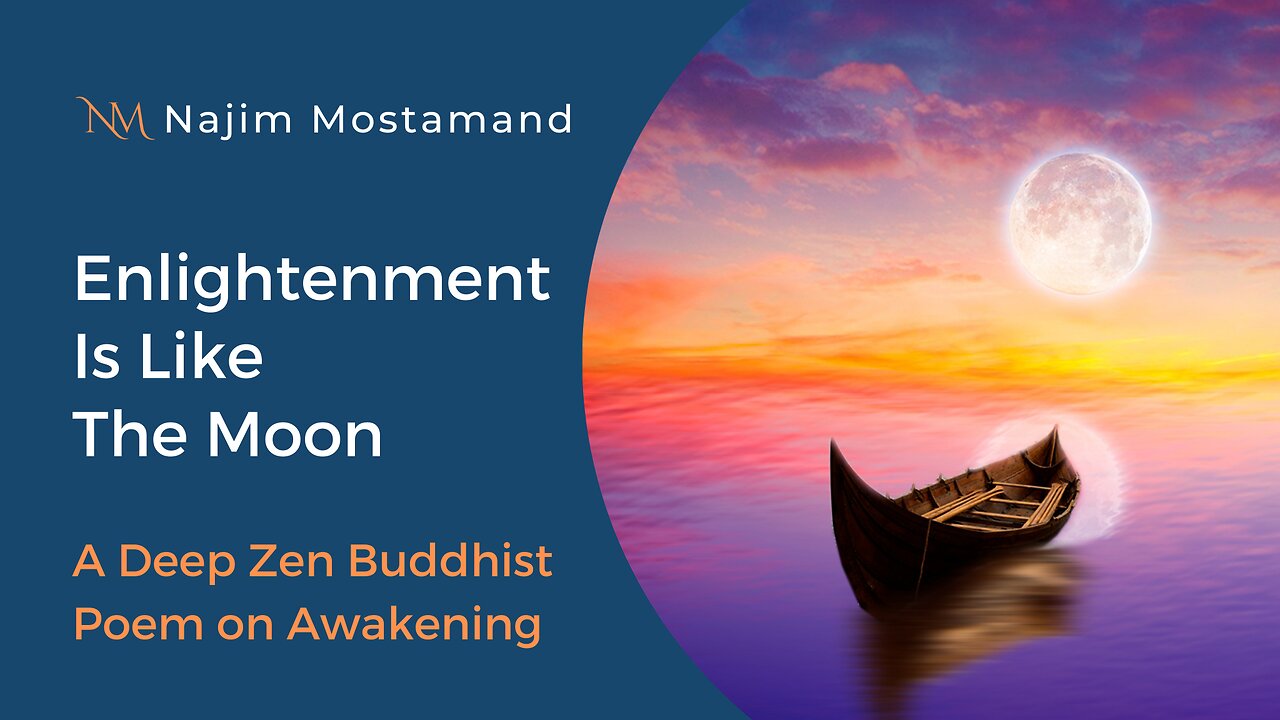Premium Only Content

Enlightenment Is Like The Moon: A Deep Zen Buddhist Poem on Awakening
Step into the world of Zen with this illuminating exploration of Dogen's Zen Buddhist poem "Enlightenment is Like the Moon."
Through careful analysis and interpretation, we'll unravel the mysteries of this Zen masterpiece, examining the symbolism of the moon as a reflection of enlightenment.
By the end of the video, you'll learn the true nature of awakening and how it can be realized and experienced by each and every one of us, right here, right now.
Whether you're a Zen practitioner, lover of poetry, or simply curious about Eastern philosophy, this video will deepen your appreciation for the wisdom of Zen poetry.
So, join me on this journey of discovery and unlock the wisdom hidden within Dogen's timeless poem.
Thank you for watching and please don't hesitate to drop a like or comment if you enjoyed the video.
Sending peace and love to all!
#enlightenment #zen #awakening
---
If you are looking for more guided meditations, spiritual poetry, and ancient wisdom for awakening, please subscribe to my YouTube channel and follow me on social:
https://www.youtube.com/c/NajimMostamand
Website: https://najimmostamand.com/
Instagram: https://www.instagram.com/najimmostamand/
Facebook: https://www.facebook.com/najimmostamand1/
Patreon Donation Page: https://www.patreon.com/najimmostamand
Medium: https://medium.com/@namostamand
© 2023 Najim Mostamand
This video is dedicated to God and all His wonderful glory. May His endless light, love, and wisdom continue to guide us all back Home.
---
Enlightenment is like the moon reflected on the water.
The moon does not get wet, nor is the water broken.
Although its light is wide and great,
The moon is reflected even in a puddle an inch wide.
The whole moon and the entire sky
Are reflected in one dewdrop on the grass.
– Dogen
---
Dogen, also known as Dogen Zenji or Eihei Dogen, was a Japanese Buddhist monk and philosopher who lived from 1200 to 1253. He is best known as the founder of the Soto school of Zen Buddhism in Japan, which emphasizes the practice of zazen, or seated meditation, as the primary means of attaining enlightenment.
Dogen was born into a noble family in Kyoto, Japan, and showed an early interest in Buddhism. He studied Tendai Buddhism, a sect of Buddhism prevalent in Japan at the time, and later traveled to China to study Ch'an (Zen) Buddhism, which had a significant influence on his thinking. Upon returning to Japan, Dogen started teaching and writing extensively, spreading his unique interpretation of Zen Buddhism.
Dogen's teachings emphasized the importance of direct experience of reality through meditation, rather than relying on scripture or intellectual understanding alone. He emphasized the concept of "just sitting" or "just being" in zazen, in which one simply sits and allows thoughts and sensations to arise without judgment or attachment. Dogen also emphasized the integration of meditation practice into everyday life, seeing enlightenment as something that is realized in every moment of ordinary life.
Dogen's most famous work is the Shobogenzo, a collection of essays and discourses on Zen practice and philosophy. It is considered one of the most important works of Japanese literature and has had a profound impact on Zen practitioners throughout the centuries. Dogen's teachings continue to inspire and influence Zen practitioners and others interested in Buddhism and meditation to this day.
-
 25:55
25:55
Najim Mostamand
1 month agoDealing with Unawakened People on Your Spiritual Journey
20 -
 6:40:53
6:40:53
Fresh and Fit
12 hours agoMyron TRIGGERED Rubi Rose, And Debating Cry Baby Blax On X Spaces!
155K113 -
 4:54:16
4:54:16
TheSaf3Hav3n
10 hours ago $22.81 earnedCALL OF DUTY: BLACK OPS 6 | A QUIET PLACE: THE ROAD AHEAD | #RumbleTakeOver
53.5K1 -
 4:05:35
4:05:35
TheNateVibez
10 hours agoOmni-🤖 - First Rumble Stream.🫡 - VETERAN
56K3 -
 2:59:26
2:59:26
Tundra Gaming Live
15 hours ago $5.09 earnedThe Worlds Okayest War Thunder Stream//FORMER F-16 MAINTAINER//77th FS//#rumblefam
33.9K -
 2:32:19
2:32:19
DemolitionDx
10 hours agoSunday night COD with friends.
112K6 -
 2:10:14
2:10:14
vivafrei
20 hours agoEp. 237: More Trump Cabinet Picks! MAHA or Slap in the Face? Canada on Fire! Go Woke Go Broke & MORE
239K298 -
 2:23:21
2:23:21
SOLTEKGG
11 hours ago $5.66 earned🟢 First Day on RUMBLE!
65.7K5 -
 7:49:06
7:49:06
Vigilant News Network
14 hours agoCOVID-Vaccinated Hit With Grave New Reality | Media Blackout
113K30 -
 1:26:31
1:26:31
Josh Pate's College Football Show
14 hours ago $4.43 earnedSEC Disaster Saturday | Major CFP Earthquake Coming | Officiating Is A Disaster | New Studio Debut
43.8K2